You Hurt My Feelings
by Hope Madden
One of filmmaker Nicole Holofcener’s great talents is to acknowledge within a film that there is no reason to feel for her characters, and then making you feel for the characters. She’s a master of the relatable if tedious angst of the privileged. In her hands, these primarily insignificant tensions are humanized and often hilarious.
Such is the case with her latest, You Hurt My Feelings, a story about a well-off couple, truly compatible and in love, who fall on hard times when one overhears the other’s honest opinion.
Julia Louis-Dreyfus, who was so magnificently flawed and empathetic in Holofcener’s 2013 film Enough Said, stars as Beth, a novelist. Well, she wants to be a novelist, but her memoir only did OK and now her agent doesn’t seem that thrilled with her first ever novel. Maybe it sucks?
No, supportive-to-a-fault husband and psychologist Don (Tobias Menzies) assures her. But secretly, honestly, maybe that’s not how he feels.
And that’s Holofcener’s next great talent – casting. Louis-Dreyfus is characteristically flawless. Her humanity, comic timing, and self-deprecating yet narcissistic humor make her every character endlessly watchable. Menzies–in many ways the emotional anchor for the film–equals her. Both face the wearying revelation that truth really does hurt, right as their midlife insecurities are at their highest.
Arian Moayed and the always amazing Michaela Watkins play a mirror couple, Beth’s sister – a discontented interior designer for the very wealthy – and her insecure if lovable actor husband. They are both tremendously endearing and funny. Capping the ensemble is Owen Teague (To Leslie), Beth and Don’s 23-year-old only son who’s coming to terms with the fact that he was raised to believe he was more special than he really is. Also, he’s a writer.
Hilarious cameos from Amber Tamblyn and David Cross as an angry couple in therapy help to clarify Holofcener’s themes and push the comedy value higher. But it’s with the core couples that the filmmaker delivers her finest moments, creating a lived-in world, a true microcosm that pokes fun at our insecurities and the little white lies that keep us happy.





